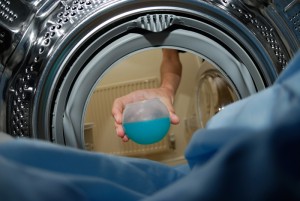Is an Extended Warranty Right for You?
 By: Douglas Trattner
By: Douglas Trattner
Originally Published: August 28, 2009
Since extended warranties often cost as much as an appliance repair, you might be better served saving that $100-$300 for when you need it.
Odds you’ll use it
Despite perceptions to the contrary, the failure rate of most new appliances is extremely low, says Tom Kraeutler, radio host of the nationally syndicated The Money Pit. “Generally speaking, if something went wrong during the manufacturing process, the problems will arise while the machine is covered by the manufacturer’s warranty,” he says.
A 2007 J.D. Power and Associates appliance reliability study seems to bear out that fact. The report, the most recent available on the topic, found that just one in 10 consumers reported a problem with a new major appliance during its first two years of operation. Major appliances are much more likely to fail as they near the end of their average lifespan (between nine and 13 years), long after most extended warranties have termed out.
Is the expense worth it?
In the situations where an appliance does need a repair outside the manufacturer’s warranty, the cost of the repair is generally the same as the money spent on an extended warranty, explains Celia Kuperszmid Lehrman, an editor at Consumer Reports. “So, even if you’re one of the unlucky ones to need the warranty, it’s pretty much a wash,” she says.
Some appliances are prone to malfunction; others are difficult and costly to repair; and still others are destined for a life of hard labor. In any of these cases an extended warranty might make financial sense. For example, it might make sense if you decide to purchase a particular brand of appliance despite its less-than-stellar reliability rating; or a high-end appliance that features sophisticated—and pricey to repair—electronic displays and controls. And if you’ve got a large family—and the laundry pile to match—it might make sense to purchase extra protection for a washing machine that will receive heavy use.
What to look for
In the rare occasions when it does make sense, purchase only those that are both inexpensive and comprehensive, explains Kuperszmid Lehrman. When it comes to price, a good rule of thumb is not to spend more than 20% of the cost of the appliance on the warranty. To determine a plan’s comprehensiveness, ignore the salesperson’s pitch and instead focus on the fine print.
First, examine the period of coverage. Many five-, three- and even two-year extended warranties begin running on the date of purchase, making the first year useless as repairs are already covered under the manufacturer’s warranty.
Next, study the exclusions to see what is and what isn’t covered. Damages caused as a result of a power surge may be covered, for example, but not those produced by flood. Malfunctions caused by a failure to properly maintain the appliance are typically excluded, as when a clogged dryer exhaust duct leads to machine failure.
Check to see with what the appliance will be replaced if repair isn’t feasible. Options range from “machines of comparable quality” to the far less desirable store voucher for fair market value. Replacements rarely are required to be the same dimension as the original, which can make for some impossible fits.
Alternatives to extended warranties
Some credit card companies (American Express, Gold MasterCard) may automatically extend the length of a manufacturer’s warranty if you place a qualifying purchase on the card. Before hitting the showroom, carefully read the terms of your specific card’s warranty upgrade service. Better yet, call the credit card’s customer service number.
For peace of mind, it may tough to beat all-in-one appliance warranties, such as All Six Warranty. For a flat rate of around $20 per month, a certain number of household appliances are protected, regardless of their ages. Apart from a predetermined service call fee—typically around $50—all repairs are covered for as long as you’re enrolled.
Kraeutler finds that the money you would spend on a plan and service calls usually meets or exceeds the amount you would spend on repairs having no plan. “Deposit that money in an appliance repair fund and properly maintain your machines,” he suggests. The unit’s manual might be a better friend than an extended warranty.
Douglas Trattner has covered household appliances and home improvement for HGTV.com, DIYNetworks, and the Cleveland Plain Dealer. During the 10-year stewardship of his 1925 Colonial, he’s upgraded almost every household appliance. After lengthy deliberation, he recently replaced an aging top-load washing machine with an energy-efficient front-load unit.
Visit houselogic.com for more articles like this. Reprinted from HouseLogic with permission of the NATIONAL ASSOCIATION OF REALTORS. Copyright 2011. All rights reserved.
Category: Home Ownership

